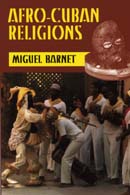 African cults and religions enrich all aspects of Cuba’s social, cultural, and everyday life and encompass all ethnic and social groups. Politics, art, and civil events such as weddings, funerals, festivals, and carnivals all possess distinctly Afro-Cuban characteristics. Miguel Barnet provides a concise guide to the various traditions and branches of Afro-Cuban religions. He distinguishes between the two most important cult forms: the Regla de Ocha (Santería), which promotes worship of the Oshira (gods), and the traditional oracles that originated in the old Yoruba city of Ile-Ife, which promote a more animistic worldview.
African cults and religions enrich all aspects of Cuba’s social, cultural, and everyday life and encompass all ethnic and social groups. Politics, art, and civil events such as weddings, funerals, festivals, and carnivals all possess distinctly Afro-Cuban characteristics. Miguel Barnet provides a concise guide to the various traditions and branches of Afro-Cuban religions. He distinguishes between the two most important cult forms: the Regla de Ocha (Santería), which promotes worship of the Oshira (gods), and the traditional oracles that originated in the old Yoruba city of Ile-Ife, which promote a more animistic worldview.
Africans who were brought to Cuba as slaves had to recreate their old traditions in their new Caribbean context. As their African heritage collided with Catholicism and with Native American and European traditions, certain African gods and traditions became more prominent while others lost their significance in the new Afro-Cuban culture. This book, the first systematic overview of the syncretization of the gods of African origin with Catholic saints, introduces the reader to a little-known side of Cuban culture.
